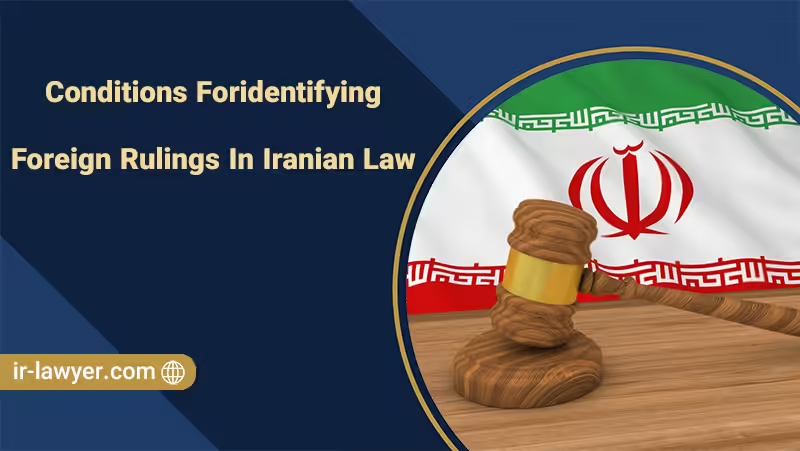dear user
I am Khalil Asayesh ( iranian lawyer from the Tehran Bar Association with license number 21129) Thank you for choosing my site to use legal services. We would like to inform you that this site has been set up with the aim of improving the level of legal information, legal advice and solving problems of domestic and international law.
My specialty is in the field of international companies and contracts, I have experience in advocacy in international arbitration, as well as experience in enforcing foreign judgments in Iranian courts and courts outside Iran (including Germany, France, Turkey, UAE.and Oman), so I am ready to provide you with legal services in this regard.
Telephone contact and whats app numbers:
09124439719 Iran
00971521583759 United Arab Emirates ( whats app)
“We are not responsible for holidays and non-working hours”
conditions for identifying foreign rulings in Iranian law
In order to investigate the conditions for identifying foreign rulings in Iranian law, articles of civil law and civil law should be discussed in combination: Article 972 of the Civil Code has poems: Rulings issued from foreign trials as well as official documents regulated abroad cannot be implemented in Iran unless they are issued in accordance with Iranian law. Therefore, in accordance with Article 973 of the Civil Code, the principle is to prevent the implementation of foreign rulings in Iran unless the Iranian court of law, in accordance with the subject, is issued by domestic law.
The implementation of foreign rulings after the courts have stated their validity and the lack of conflict between these votes and public order and in fact their influence is given under Iranian law. Article 974 of the I.M. also removes little ambiguity regarding the principle of non-implementation of foreign rulings, and according to this article: Articles 7 and Articles 962-974 of this Law shall be implemented in a timely way that is not against the international agreement signed by the Iranian government or is not against special laws. This article adds another condition for the implementation of Article 972, which is the non-opposition to international law and special laws. However, in the law on the implementation of civil rulings, the status of identifying foreign rulings is otherwise stated: At the top of Article 169, it is noted that civil rulings issued by foreign courts are applicable in Iran if they meet the following requirements, unless otherwise prescribed by law.
It is inferred from the appearance of this article that the legislature has placed the principle on the implementation of foreign rulings. This is because by stating the adverb “unless” refers to the lack of implementation of exceptional cases and this is the difference between Article 972 and this article. According to jurists, Article 972 is one of the cases of public order and it is not possible to predict the opposite rule in other cases.
However, Article 169 of the Civil Code has accepted this possibility. In any case, according to some jurists, the recent article considers the principle to be capable of implementing foreign sentences. However, looking deeply at these two articles, it can be said that there is no difference between them: because Article 972 requires the permission of Iranian courts to carry out foreign sentences, and Article 169 of the Civil Sentence Enforcement Act for the implementation of these sentences has foreseen the conditions in which the court must meet these requirements.
This analysis was in line with the discussion that was mentioned at the beginning of the article and we said that there is a difference between the barriers to the implementation of foreign law and the obstacles to the implementation of foreign sentences. As articles 170 onwards of the Civil Sentence Enforcement Act in the completion of Article 169 of the same law considers the request for the implementation of foreign sentences from the Iranian courts and the issuance of permits from the conditions of foreign sentences.
This is the same issue referred to in Article 972 and finally, Iranian law provides for the ability to enforce foreign sentences in Iran. However, in order for foreign decrees to be implemented in Iran, they can pass through the Iranian courts and obtain permission to implement them. Therefore, in order to determine the way domestic courts take action in assessing foreign rulings, the Iranian legislator has provided the conditions for implementation in Article 169 of the Civil Code and in the completion of Article 972 of the Civil Code for issuing orders.




